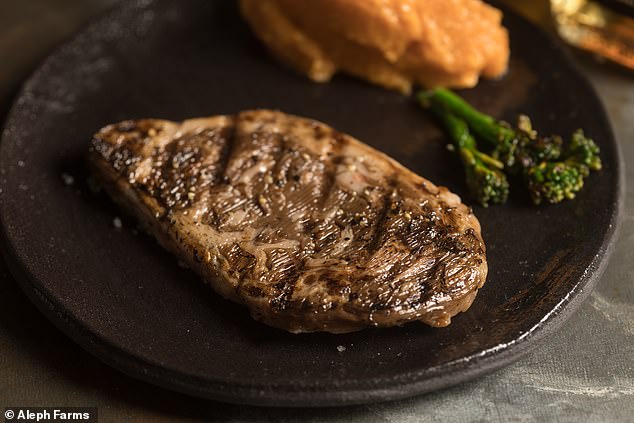The first 3D steak: just as juicy as the one you’d buy from a butcher
A juicy steak is a delight for many, but eating meat is increasingly falling out of fashion due to ethical and environmental concerns.
Now, an Israeli company has unveiled the world’s first 3D bioprinted steak made with real cow cells, and it’s completely slaughter-free.
The scientists took swabs from two cows, cloned them, grew them in the lab and put them all together to form a replica steak.
Aleph Farms, the company behind the “Frankenstein meal,” says extracting the cells is no more painful or invasive than taking a cheek swab, which is the first thing anyone gets at a typical doctor’s appointment.
The cows that give their cells to this process are not killed, but the product is real meat, which is a conundrum for some vegetarians who have chosen that way of eating to protect the environment or prevent cruelty to animals.
Aleph claims that lab-grown meat offers the same flavorful and juicy attributes as authentic butcher-bought meat.


Aleph has created a 3D bioprinting technology that allows them to precisely arrange various cellular structures on top of each other to form steaks.
The company has two incubators at its Tel Aviv facility, Alberto and Gertrude, named after the two donor cows.
Any steak made by Aleph is technically either Gertrude or Alberto.
Both incubators mimic the conditions inside the cow to create the most accurate cells possible.
Four different cells are created – support cells, fat cells, blood vessel cells and muscle cells – which then become the ‘ink’ in the 3D bioprinter.
The company believes its new method is a big leap forward towards its dream of creating a “more sustainable, fair and safe world”.
Currently, lab-grown steak is far more expensive than its organic counterparts due to resource and expertise limitations, but Aleph hopes to upgrade its production in the coming years.

No price has yet been announced for the steak, and Aleph predicts it will be two to three years before the technology is developed to the point where the product is commercially available.
“We have a clear plan to achieve cost stability for growing meat products at scale,” Mr Toubia said.
“We expect to achieve this goal within five years of our launch in 2022, which is closer to the new generation of plant-based meat substitutes.”
He adds: “We recognize that some consumers crave larger and thicker cuts of meat.”

Commenting on the announcement, a spokesperson for the Vegan Society told MailOnline that any invention that reduces animal suffering is welcome, but the Aleph product does not qualify as vegan because it is made from animal cells.
“Sooner or later, the world’s growing population will be forced to eat less meat because factory farming is not sustainable,” the spokesman said.
“Instead of waiting for this to happen, it’s better for the animals and the planet to try to find an alternative for those who aren’t ready to go vegan at the moment.”
“We understand that there can be huge environmental benefits from cultured meat.”
“However, the debate over whether the future of food is lab-grown meat can be seen as a distraction from the real question, which should be how to promote plant-based diets that are a valid solution here and now.”
